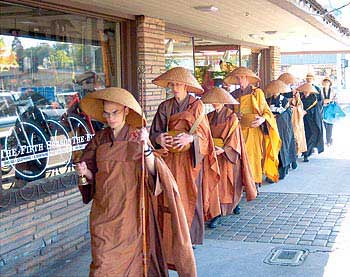|
Alms
Round Symbolic of Human Dependence

Wearing
traditional garb, Buddhist monks from Shasta Abbey
make an alms round through downtown Mount Shasta.
By
Paul Boerger
With
their traditional garb suspending time to another era, a group
of Buddhists from Shasta Abbey made a traditional alms round
in Mount Shasta last week from the Lake Street Shopping Center
through downtown.
Dressed
in Buddhist robes and carrying specially prepared alms bowls,
the monks did not speak. The lead monk rang a soft bell and
tapped a cane on the ground.
Their
large circular hats covered their faces as they walked slowly
in single file silence, broken only by the occasional blessing
prayer bestowed for gifts.
They
accepted only food and were not allowed to accept meat, alcohol
or garlic. They did not ask for anything, but only made themselves
available for an offering.
Rev.
Daishin of Shasta Abbey said the alms round "is not begging."
"We're
not asking for anything or for the whole town to turn out,"
Daishin said. "We commit ourselves to living through the
generosity of other people. In return, we offer Dharma teachings
at the Abbey. The food is shared with everyone who comes here."
The
alms round is an important tradition in Buddhism, involving
blessings for both giver and receiver.
According
to Buddhist teacher Thanissaro Bhikku, the alms round reminds
a monk "that their practice is not just an individual matter,
but a concern of the whole community. They are indebted to others
for the right and opportunity to practice, and should do their
best to practice diligently as a way of repaying the debt."
For
the giver, Bhikku says, "the alms round is a reminder that
the monetary system economy is not the only way to happiness."
Daishin
said the alms round teaches that "all human beings are
dependent on each other."
"There
is a heart connection in giving something," Daishin said.
|